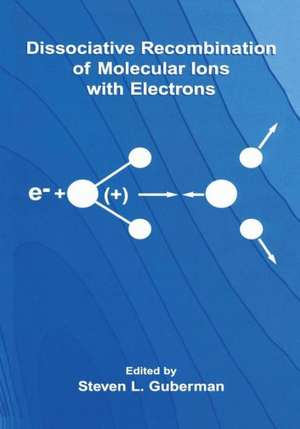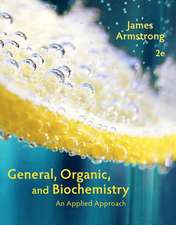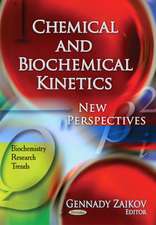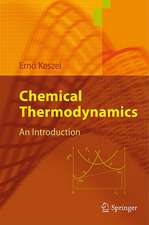Dissociative Recombination of Molecular Ions with Electrons
Editat de Steven L. Gubermanen Limba Engleză Paperback – 12 oct 2012
| Toate formatele și edițiile | Preț | Express |
|---|---|---|
| Paperback (1) | 959.50 lei 6-8 săpt. | |
| Springer Us – 12 oct 2012 | 959.50 lei 6-8 săpt. | |
| Hardback (1) | 969.28 lei 6-8 săpt. | |
| Springer Us – 30 aug 2003 | 969.28 lei 6-8 săpt. |
Preț: 959.50 lei
Preț vechi: 1170.12 lei
-18% Nou
Puncte Express: 1439
Preț estimativ în valută:
183.60€ • 200.24$ • 154.81£
183.60€ • 200.24$ • 154.81£
Carte tipărită la comandă
Livrare economică 24 aprilie-08 mai
Preluare comenzi: 021 569.72.76
Specificații
ISBN-13: 9781461349150
ISBN-10: 146134915X
Pagini: 492
Ilustrații: XV, 473 p.
Dimensiuni: 178 x 254 x 26 mm
Greutate: 0.85 kg
Ediția:Softcover reprint of the original 1st ed. 2003
Editura: Springer Us
Colecția Springer
Locul publicării:New York, NY, United States
ISBN-10: 146134915X
Pagini: 492
Ilustrații: XV, 473 p.
Dimensiuni: 178 x 254 x 26 mm
Greutate: 0.85 kg
Ediția:Softcover reprint of the original 1st ed. 2003
Editura: Springer Us
Colecția Springer
Locul publicării:New York, NY, United States
Public țintă
ResearchDescriere
In dissociative recombination, a molecular ion captures an electron and fragments into atoms, molecules or ions. Dissociative recombination plays an important and often dominant role in many low to moderate temperature plasmas found in planetary ionospheres, the interstellar medium, fusion devices, laboratory experiments, and the region near reentry vehicle heat shields. The process has been studied for over 50 years but many of its mechanisms and those of competing processes have only been elucidated recently. Indeed, the study of dissociative recombination has been a challenge for both experimentalists and theoreticians and many areas of modern chemical physics have been employed to unlock its secrets.
Dissociative Recombination of Molecular Ions with Electrons is a comprehensive collection of refereed papers describing the latest developments in dissociative recombination research. The papers are written by the leading researchers in the field. The topics covered include the use of microwave afterglows, merged beams and storage rings to measure rate coefficients and to identify the products and their yields. The molecules studied range in size from the smallest, H2+, to bovine insulin ions. The theoretical papers cover the important role of Rydberg states and the use of wave packets and quantum defect theory to deduce cross sections, rate constants and quantum yields. Several theoretical and experimental papers address the controversial topic of H3+ dissociative recombination and its importance in the interstellar medium. Dissociative recombination studies of other molecular ions in the interstellar medium and in cometary and planetary atmospheres are covered. Ionization is an important competitive process to dissociative recombination and its competition with predissociation and its role in the reverse process of the association of neutral species is presented. Dissociative attachment, in which an electron attaches to a neutral molecule, has many similarities to dissociative recombination. The topics covered include the accurate calculation of electron affinities, attachment to molecules, clusters, and to species absorbed on solid surfaces and electron scattering by a molecular anion.
Dissociative Recombination of Molecular Ions with Electrons is a comprehensive collection of refereed papers describing the latest developments in dissociative recombination research. The papers are written by the leading researchers in the field. The topics covered include the use of microwave afterglows, merged beams and storage rings to measure rate coefficients and to identify the products and their yields. The molecules studied range in size from the smallest, H2+, to bovine insulin ions. The theoretical papers cover the important role of Rydberg states and the use of wave packets and quantum defect theory to deduce cross sections, rate constants and quantum yields. Several theoretical and experimental papers address the controversial topic of H3+ dissociative recombination and its importance in the interstellar medium. Dissociative recombination studies of other molecular ions in the interstellar medium and in cometary and planetary atmospheres are covered. Ionization is an important competitive process to dissociative recombination and its competition with predissociation and its role in the reverse process of the association of neutral species is presented. Dissociative attachment, in which an electron attaches to a neutral molecule, has many similarities to dissociative recombination. The topics covered include the accurate calculation of electron affinities, attachment to molecules, clusters, and to species absorbed on solid surfaces and electron scattering by a molecular anion.
Cuprins
Dissociative Recombination Mechanisms.- Microwave Afterglows.- Dissociative Recombination of Electrons and Ions: The Early Experiments.- Optical Spectroscopy of Recombining Ions in Flowing Afterglow Plasmas.- Technique for Distinguishing and Determining the Origin of Photon Emissions from He+/Ar+ Plasmas.- Reactions of Electrons with Hydrocarbon Cations: From Linear Alkanes to Aromatic Species.- Dissociative Recombination of Xe2+ and XeH+.- Dissociative Recombination of Protonated Dimer Ions.- Storage Rings.- An Electrostatic Storage Ring for Studying Electron-Ion Collisions at KEK.- Studies of Dissociative Recombination in CRYRING.- Recent Studies of Three-Body Fragmentation Dynamics via Dissociative Recombination in CRYRING.- Dissociative Recombination of Vibrational Excited Levels in Oxygen Molecular Ions.- Studies of Electron Collisions with CN+, CN? and HCN+/HNC+.- Electron Induced Vibrational Deexcitation of the Molecular Ions H2+ and D2+.- General Theory.- Wave Packet Studies of Dissociative Recombination.- Stark Mixing in Rydberg Systems by Ultralow Energy Collisions with Ions.- Analytical Treatment of the K Matrix Integral Equation in the Dynamics of Superexcited Molecules.- Extension of the Quantum Defect Theory and Its Application to Electron and Molecular Ion Collisions.- The Dissociative Recombination of N2+.- Dissociative Recombination of Slow Electrons and Molecular Oxygen Ions in a Strong Laser Field.- Dissociative Recombination of c-C3 H3+.- H3+ Theory and Experiment*.- Help!!! Theory for H3+ Recombination Badly Needed.- Importance of Jahn-Teller Coupling in the Dissociative Recombination of H 3+ by Low Energy Electrons.- A Model for Calculating Branching Ratios in H3+ Dissociative Recombination.- Quantum Dynamical Study of H3+ Recombination.- Recombination of H3+ and D3+ with Electrons.- Breakup Dynamics in H3+ and D3+ Dissociative Recombination.- Coupling of Bound States to Continuum States in Neutral Triatomic Hydrogen.- Ionization.- Rotationally Resolved Photoelectron Spectra from Vibrationally Autoionizing Rydberg States of NO.- Predissociation versus Autoionization for High Rydberg States of H2.- Vibrational Autoionization In Polyatomic Molecules.- State-Selected Associative Ionisation as a Probe of the Molecular Dissociative Channels.- Ultracold Molecules: Formation, Detection.- Merged Beam Studies of Associative Ionization.- Astrophysical and Ionospheric Applications.- Dissociative Recombination in Interstellar Clouds.- Enigma of H3+ in Diffuse Interstellar Clouds.- Dissociative Recombination and Deuterium Fractionation in Interstellar Clouds.- Dissociative Recombination in Cometary Ionospheres.- Absolute Total State-Selected Cross Sections for Ion-Molecule Reactions of Importance in Planetary Ionospheres.- Attachment and Detachment.- Calculation of Electron Affinities.- Dissociative Electron Attachment in Gas and Condensed Phases.- Electron Collisions with C4? : Detachment Process and Resonant Structure.- Dissociative Electron Attachment at Low Temperature to Clusters.- Large Enhancements in Dissociative Electron Attachment to Chlorine Containing Molecules Adsorbed on H2O Ice.










